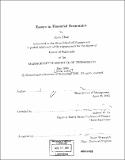Essays in financial economics
Author(s)
Chae, Joon, 1967-
DownloadFull printable version (3.375Mb)
Other Contributors
Sloan School of Management.
Advisor
Andrew W. Lo.
Terms of use
Metadata
Show full item recordAbstract
In Chapter 1, I investigate trading volume before scheduled and unscheduled corporate announcements to explore how traders respond to private information. I show that cumulative trading volume decreases by more than 15% prior to scheduled announcements. The decline in trading volume is largest when information asymmetry is high, while the opposite relation holds for volume after the announcement. In contrast, trading volume before unscheduled announcements increases dramatically and shows little relation to proxies for information asymmetry. All the results for scheduled announcements are consistent with asymmetric information theories, where discretionary liquidity traders (DLTs) decrease volume when they know there is much adverse selection. However, DLTs do not seem to read information embedded in prices before unscheduled announcements. I further investigate the behavior of market makers and find that they act appropriately by increasing price sensitivity before all announcements. This implies that market makers extract timing information from their order books. Chapter 2 is joint work with Li He and professor Andrew W. Lo. We implement various statistical analyses on stock market returns, using CRSP equal weighted and value weighted index returns from 1926-2001, as Fama (1965) did more than 35 years ago. Investigating marginal and conditional stock return distribution, we report many characteristics of stock return distributions. First, stock return distribution is still not following a normal distribution even though many studies have been assuming this. (cont.) Second, autocorrelations of stock market returns are not zero as verified by many predictability studies. The magnitude of autocorrelations varies considerably from one period to another. In addition, we analyze several stock market anomalies, such as January effect, turn-of-the-month effect, turn-of-the-quarter effect, and weekday effect. Interestingly, most effects are still significant after many years of their discoveries.
Description
Thesis (Ph. D.)--Massachusetts Institute of Technology, Sloan School of Management, 2003. Includes bibliographical references (leaves 66-68).
Date issued
2003Department
Sloan School of ManagementPublisher
Massachusetts Institute of Technology
Keywords
Sloan School of Management.